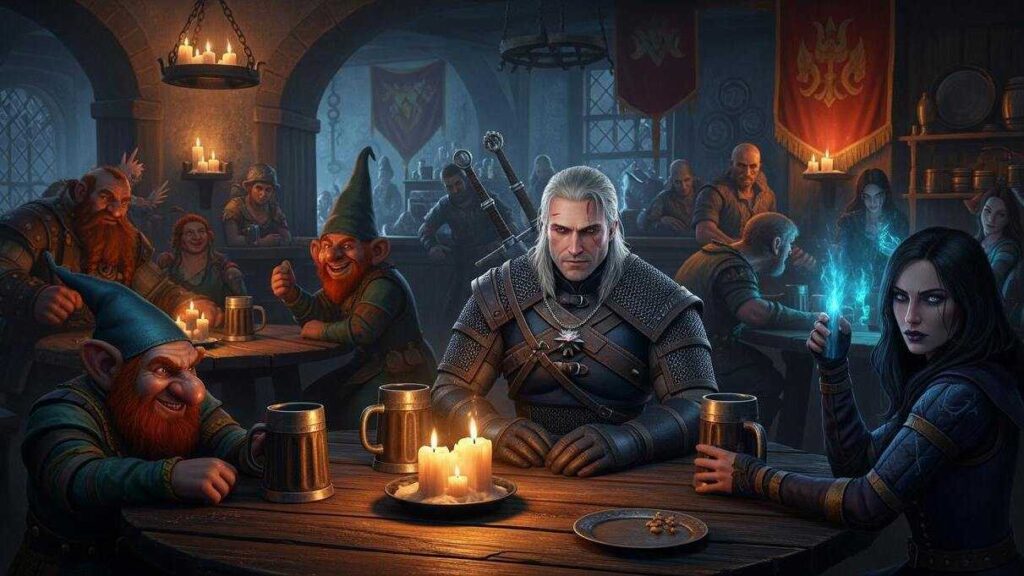Science
How Did Life Rebound on Earth? The Answer Lies Within the Rocks
23 February 2026

There is probably no one in the world—well, maybe apart from people living in the wildest jungles and Eskimos in the furthest corners of the polar north—who, upon seeing a white-haired man with a characteristic scar on his face, wouldn't exclaim, "Geralt!" Or, if they've forgotten the name, at least "witcher!" The Witcher could, however, have never come to be. There would be no novels, no short stories, no comics, no movies, no TV series, and no games. Why? We'll reveal the fascinating history behind The Witcher below.
The character of Geralt of Rivia – a monster slayer and defender of humanity – is the most powerful symbol of Polish pop culture, and his creator, Andrzej Sapkowski, is the most recognizable Polish writer in history. Of course, someone might take offense and exclaim, “But what about the Nobel laureates?” The thing is, a Nobel Prize isn’t a popularity award. The prize is practically awarded by a handful of Swedish academics who follow their own whims.
It has often gone to authors who were unknown or nearly unknown, gaining recognition only because of it. Besides, who remembers the names of all the Nobel laureates? They are often creators who emerge from obscurity, enjoy a brief moment of triumph, and then return to obscurity, with no one remembering them again. Well, except perhaps for genre experts or literary historians. Sapkowski’s books boast gigantic print runs, consistently holding leading spots on the New York Times bestseller list. Furthermore, his work has inspired screen adaptations, including three TV series, a feature film, and animated productions, alongside a game series considered one of the most significant achievements in the history of computer gaming with a record 75 million copies sold!
It was The Witcher’s success that allowed the previously struggling company CD Projekt to build a gigantic fortune, with its owners entering the top ten richest people in Poland with assets counted not in hundreds of millions, but in billions of zlotys! So, one could say that Sapkowski, thanks to The Witcher, not only became a multimillionaire but also created billionaires.
You may be interested: The Fantasy Crisis. What Is Missing in Today’s Fictional World Productions?

Recently, during the Holistic Talk meetings, I gave a lecture on alternative worlds. I explained how the theory of multiverses is part of string theory in quantum physics. This theory says our universe splits into other universes at every moment. Some are almost identical to ours, differing only at a quantum level, while others are completely different. Therefore, our multiverse includes worlds where humanity never existed, dinosaurs still live, and communism triumphed across the planet. There are even worlds where our planet doesn’t exist at all, having been destroyed by a cosmic catastrophe.
In short, every world we can theoretically imagine exists in reality, just in another dimension. Some of these worlds are easy for us to imagine, while others require a great leap of faith in miraculous coincidences. History shows us that sometimes a single, small decision by one person can change the fate of the world. One stubborn man can change not only the fate of a defendant (as in the film 12 Angry Men) but also (as in this case) the fate of world literature and pop culture.
The world without the pop culture phenomenon of The Witcher was within arm’s reach. So, how exactly did it come into being? Andrzej Sapkowski, encouraged by his son, decided to submit a short story to a literary contest held by the monthly magazine Fantastyka. The head of the Polish literature department and the contest’s chief judge was editor Maciej Parowski. At the time, Sapkowski was a complete unknown in the literary world. With a solid education and an excellent command of several foreign languages (a unique thing in the Polish People’s Republic), he was a successful international trader. However, since he was passionate about fantasy literature and had read countless books in both English and Russian, he decided to try his hand at writing.
That’s how the first short story about Geralt the witcher, simply titled Wiedźmin, was born. And it would have vanished from the contest without a trace. Why? Because Parowski had an aversion to what he called “entertainment literature” or “American” literature. For him, fantasy needed to be profound, socio-political, preferably complicated, or even incomprehensible to most readers, so that only initiated scholars could grasp its true meaning – a kind of “cinema of moral anxiety” in a fantasy format. This is a crucial part of the history behind The Witcher.

With its simple, action-packed plot, Wiedźmin didn’t fit that model at all. Consequently, it was meant to be eliminated from the contest without any award, and no one would even notice it.
It ultimately received third place (sic!) thanks to Lech Jęczmyk, an expert in Anglo-Saxon and Russian literature, a distinguished translator (of books by Kurt Vonnegut, Philip K. Dick, and Joseph Heller’s Catch-22, among others), and the legendary editor of such iconic series as Kroki w nieznane and Rakietowe szlaki. Jęczmyk immediately recognized the diamond in both the story and Sapkowski’s talent. He threatened to leave the Fantastyka editorial team if the story wasn’t awarded and published. And only under the pressure of this ultimatum did Parowski relent.
Adding to the story, Sapkowski has repeatedly stated, both publicly and in private conversations, that if the Fantastyka judges had rejected his text, he would have lost the motivation to write anything more. It was meant to be his first and last attempt, a final test of his literary abilities. At the time, Sapkowski was 38 years old, which was a very, very advanced age for a debut.
So, you see, one man – Lech Jęczmyk – and his conviction that this was an outstanding work by a promising author saved The Witcher from oblivion. Readers later confirmed that opinion, falling in love with both Sapkowski’s hero and the author’s own style: free-flowing, witty, humorous, and full of sharp dialogue, many phrases of which have entered common parlance.
Worth reading: Why Do We Escape to Magic? Psychologists Peek Inside the Reader’s Mind
An accusation of plagiarism undoubtedly boosted Sapkowski’s popularity early in his career. The claim was widely commented on in the pages of Fantastyka and by writers and readers, all of whom firmly backed Sapkowski. The accuser believed Sapkowski took his story idea from Strzyga, a 19th-century short story by Roman Zmorski. There is some truth to this, as the plot concepts are similar. Crucially, though, the main characters differ. Zmorski’s story features a simple country bumpkin, Marcin, while Sapkowski’s hero, Geralt, is an intelligent, highly skilled monster slayer.
And we must remember that literature also involves the creative processing of myths, legends, and fairy tales, drawing from our civilization’s existing artistic heritage. Sapkowski exercised this right, just as thousands of other artists have done in every field of art. He added so much of himself in both content and style that he created an entirely new quality.
Finally, an anecdote. There is probably nothing that irritates Sapkowski more than the somewhat common opinion in the West that he based his short stories and novels on the TV series or video games. This does happen often in the US – a novel might be written based on a film, TV series, or role-playing system. But in this case, of course, it is Sapkowski who created The Witcher, his companions, and their world, with all its socio-political complexity. The filmmakers and game developers simply benefited from the riches of that world.
So, if someone mistakes the creator for a derivative artist, it’s bound to anger and hurt the creator. Therefore, when you meet Sapkowski, remember not to ask if he’s happy he was given the chance to write a book about a world created by the game developers. Unless, of course, you’re looking for a punch in the face…
Read the text in Polish: Jacek Piekara: Wiedźmin miał zginąć, zanim powstał

Science
22 February 2026

Humanism
22 February 2026

Zmień tryb na ciemny